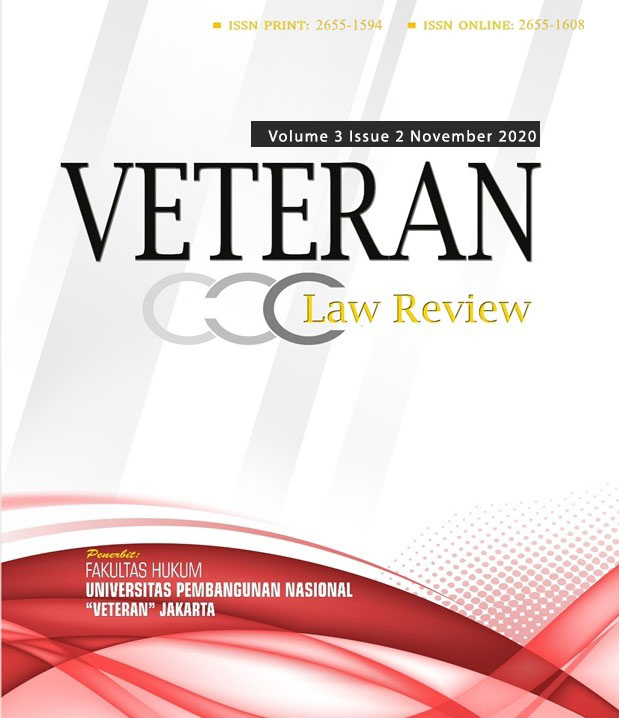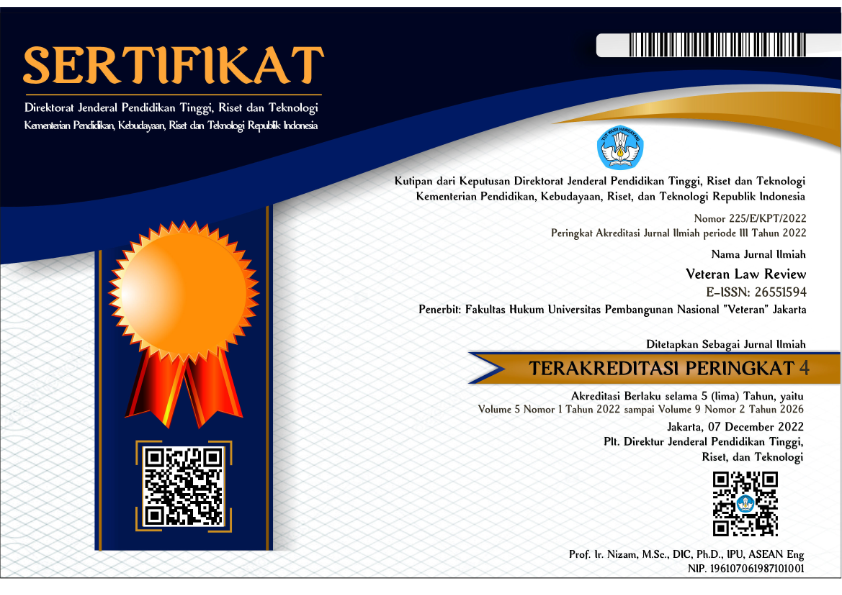Implementation Law Issues Of Supreme Court Regulation No. 4 Of 2019 About Perma Revision No. 2 Of 2015 About Small Calim Court Resolution Procedures And Its Settlement Efforts
DOI:
https://doi.org/10.35586/velrev.v3i2.2110Abstract
Legal dispute resolution can be done through non-litigation channels or through litigation channels. The non-litigation route as an alternative to dispute resolution (APS) outside the court route through its main mechanism, namely negotiation, mediation and arbitration, is increasingly loved by the public, especially the business world, because it offers various advantages compared to using the litigation route. But for some people, they still view dispute resolution through litigation as the main dispute resolution so that the consequence is that there is a buildup of cases in courts both at the first level, especially at the Supreme Court level. To anticipate this, the Supreme Court issued Perma No. 2015 concerning Procedures for Settlement of Small Claim Courts which was later revised to Perma No. 4 of 2019 concerning Amendment of Perma No. 2 of 2015 concerning Procedures for Settlement of Small Claim Courts. The Supreme Court's biggest hope is that this procedure can reduce the buildup of cases and can provide a sense of justice for the small community who demand justice, but in its implementation, there are still several legal problems that can cause the Small Claim Court to not run optimally. This study uses a normative juridical method supported by interviews. The primary data of this research are interviews with Supreme Court officials and several District Courts such as Central Jakarta District Court Class IA, Bandung District Court Class IA, Bale Bandung District Class IA and Garut District Court. Secondary data for this research were obtained from a literature study of laws and regulations governing the Small Claim Court procedure. Based on the results of the research, there are several problems related to the application of the Regulation on Small Claim Court related to the binding power of the use of the Small Claim Court, the use of a single judge in deciding, the problem of domicile differences. These problems can be minimized with several efforts to resolve them properly and effectively so that the application of the principles of fast, simple and low cost justice in a Small Claim Court is not only a mere slogan without any real realization.
Downloads
References
X, Sultan Hamengku Buwono. (2007), Knitting Back To Our Indonesia. Jakarta : PT Gramedia Pustaka Utama.
Great Dictionary Indonesia Language.(2009). Jakarta. PT Media Pustaka Phoenix.
Marzuki, Peter Mahmud. (2005).Legal Research. Jakarta. Prenada Media.
Juwono, Hikmahanto. (2006). Law enforcement in Law and Development : Problem dan fundamen for Solutions in Indonesia. Jakarta. Varia Peradilan No.244.
Soekanto, Soerjono. (2001). Introduction to Legal Research. Jakarta. Rajawali.
Constitution of the Republic of Indonesia in 1945
Law No. 3 of 2009 on the Supreme Court.
Law No. 48 of 2009 on Judicial Power.
Herziene Inlandsch Reglement (HIR)
Rechtsreglement voor de Buitengewesten (Rbg)
Perma No. 2/2015 On Small Claim Court Settlement Procedures.
Perma No. 3 of 2018 On The Administration of Cases in The Court Electronically
Perma No. 4 of 2019 On Perma Revision No. 1 of 2015 On Small Claim Court Settlement Procedure.
Downloads
Published
How to Cite
Issue
Section
License
Copyright (c) 2022 Veteran Law Review Journal
Veteran Law Review © 2022 by Faculty of Law Universitas Pembangunan Nasional "Veteran" Jakarta is licensed under Creative Commons Attribution 4.0 International

1. License
The non-commercial use of the article will be governed by the Creative Commons Attribution license as currently displayed on Creative Commons Attribution 4.0 International.
2. Author(s)' Warranties
The author warrants that the article is original, written by the stated author(s), has not been published before, contains no unlawful statements, does not infringe the rights of others, is subject to copyright that is vested exclusively in the author, and free of any third party rights, and that any necessary written permissions to quote from other sources have been obtained by the author(s).
3. User/Public Rights
VELREV's spirit is to disseminate articles published are as free as possible. Under the Creative Commons Attribution-ShareAlike 4.0 International License. VELREV permits users to copy, distribute, display, and perform the work for non-commercial purposes only. Users will also need to attribute authors and VELREV to distributing works in the journal and other media of publications.
4. Rights of Authors
Authors retain all their rights to the published works, such as (but not limited to) the following rights;
- Reproduce the work
- Prepare derivative works based upon the work
- Distribute copies of the work
- Perform the work publicly
- Display the work publicly
- Copyright and other proprietary rights relating to the article, such as patent rights,
- The right to self-archive the article,
- The right to enter into separate, additional contractual arrangements for the non-exclusive distribution of the article's published version (e.g., post it to an institutional repository or publish it in a book), with an acknowledgement of its initial publication in this journal (Veteran Law Review).
5. Co-Authorship
If the article was jointly prepared by more than one author, any author submitting the manuscript warrants that he/she has been authorized by all co-authors to be agreed on this copyright and license notice (agreement) on their behalf, and agrees to inform his/her co-authors of the terms of this policy. VELREV will not be held liable for anything that may arise due to the author's internal dispute. VELREV will only communicate with the corresponding author.
6. Royalties
Being an open accessed journal and disseminating articles for free under the Creative Commons license term mentioned, author(s) are aware that VELREV entitles the author(s) to no royalties or other fees.
7. Miscellaneous
VELREV will publish the article (or have it published) in the journal if the article’s editorial process is successfully completed. JOSI's editors may modify the article to a style of punctuation, spelling, capitalization, referencing, and usage that deems appropriate. The author acknowledges that the article may be published so that it will be publicly accessible and such access will be free of charge for the readers as mentioned in point 3.


















